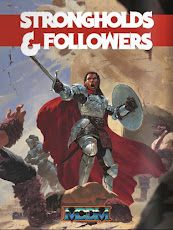Following long-standing precedent, the Board affirmed a refusal to register the proposed mark STRONGHOLDS & FOLLOWERS for "Role playing game equipment in the nature of game book manuals" on the ground that the mark is the title of a single work and therefore does not function as a trademark under Section 1, 2, and 45 of the Lanham Act. In re MCDM Productions, LLC, Serial No. 90328783 (March 8, 2022) [precedential] (Opinion by Judge Elizabeth A. Dunn).

The CAFC and its predecessor, the CCPA, have ruled that "[t}he title of a single creative work, such as a book, is not considered to be a trademark, and is therefore unregistrable." See, for example, Herbko Int'l, Inc. v. Kappa Books, Inc., 308 F.3d 1156, 64 USPQ2d 1375, 1378 (Fed. Cir. 2002); In re Cooper, 254 F.2d 611, 117 USPQ 396 (CCPA 1958). ("[H]owever arbitrary, novel, or nondescriptive of contents the name of a book - its title - may be, it nevertheless describes the book.").
Applicant MCDM's goods "plainly are books" and admittedly not a series of books. The term STRONGHOLDS & FOLLOWERS appears on the front of the game manual (see specimen above) in the place where the title usually appears. MCDM's website allows the purchase of "STRONGHOLDS & FOLLOWERS" as a single title in print and electronic (.pdf) formats. The Board observed that "selling a book in different formats does not preclude a finding that the title names a single work." See Mattel v. Brainy Baby, 101 USPQ2d at 1144; In re Appleby, 159 USPQ 126, 127 n.1 (TTAB 1968).
MCDM contended that STRONGHOLDS & FOLLOWERS is recognized by consumers as a source indicator, but the Board found no evidence that the term is seen as anything other than the title of the manual. The Board rejected MCDM's contention that an analysis of acquired distinctiveness is relevant. MCDM relied on the nonprecedential Board decision in In re King Prod, Inc. [TTABlogged here]. "The Federal Circuit has foreclosed the argument that the title of a single work is registrable if it has acquired distinctiveness." See Herbko, 64 USPQ2d at 1378 ("the publication of a single book cannot create, as a matter of law, an association between a book's title (the alleged mark) and the source of the book ("the publisher.)").
MCDM next pointed to third-party registrations for similar role playing game manuals, but the Board once again pointed out the each case must be decided on its own record. Moreover, it was not clear whether the third-party marks were used for a series of works, which would make their registration consistent with case precedent.
Finally, MCDM argued that its manual is an activity book not subject to the single work refusal. See TMEP Section 1202.08(b). The rationale expressed in the TMEP is that an activity book changes in content with each new issue. The Board, however, found that MCDM's manual does not offer activities, but rather instructions.
The record shows that Applicant's role playing game manuals, though intended to guide action in a game, are not activity books in which the content changes with each issue. Rather, Applicant's role playing game manuals include unchanging instruction on a method of play, and so the refusal of the title fits squarely in the line of cases finding that registration of the title of a single instructional manual is barred.
And so, the Board affirmed the refusal.
Read comments and post your comment here.
The content of this article is intended to provide a general guide to the subject matter. Specialist advice should be sought about your specific circumstances.

